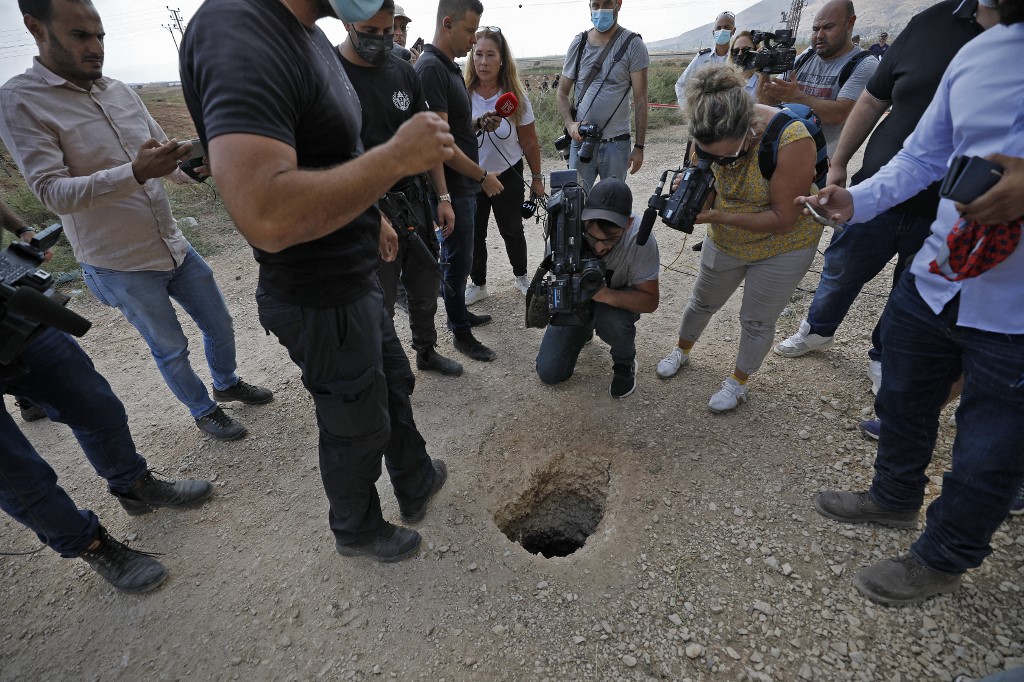Palestinian prison break reveals a path to freedom

Six Palestinian prisoners escaped from the high-security Gilboa prison in northern Israel on Monday, using a tunnel and apparently coordinating their escape via a smuggled mobile phone. The ensuing manhunt, along with headlines in Israeli newspapers and responses on social media, created an action-film halo around the event, which came on the Jewish holiday of Rosh Hashanah.
The escape was planned despite the closure imposed across the occupied West Bank during the holiday. The response from the Israeli government and the Israel Prison Service (IPS) was one of surprise and humiliation. The prison break quickly became a symbolic event, giving hope that all Palestinians living under Israeli occupation can find a way to break free.
The refusal of Israeli authorities to permit fair trials for Palestinians leaves no choice but to consider all Palestinians in Israeli prisons as political prisoners
Palestinian prisoners receive minimal services in Israeli prisons, and must pay for food and hygiene products from their own pockets. Although the Palestinian Authority (PA) transfers payments to the canteen accounts of prisoners to help keep them alive, right-wing Israeli politicians have attacked this practice, and in 2018 the Knesset passed a law to deduct such payments from the tax money Israel collects on behalf of the PA and is legally obligated to transfer.
Despite the unwillingness of Israeli authorities to maintain basic dignity for Palestinian prisoners, no aspect of the occupation is more expensive than the prison system. According to the Israeli government, since the 1967 occupation and until 2008, the budget of the Israeli police and prison ministry has increased by 18.8 percent every year, more than any other ministry.
The money is not directed to ensuring prisoners’ standard of living, but rather is invested in security and keeping prisons under strict control. The escape on Monday made a mockery of this.
Colonial blindness
In covering the security breach, Israeli news sources failed to mention the biggest breach of all: the blindness of Israel’s colonial society, easily outsmarted by these prisoners.
In the documentary miniseries Megiddo, about Israel’s Megiddo facility for Palestinian political prisoners, intelligence officers focused on a drawing by a prisoner, which was interpreted as a plan for a kidnapping. The officers appeared reluctant to read texts in Arabic or to listen to Arabic conversations, instead focusing on the drawing. Indeed, the study of Arabic by Israeli intelligence services has been in decline for decades, as it is considered demeaning - akin to officers “going native”.
At the same time, a recent satirical television show called Shabas (the Hebrew name for the IPS) portrayed a fantasy prison, in which both Israeli and Palestinian prisoners were kept side by side. The show portrayed Palestinian prisoners as non-political, and obsessed over vegan food, gender identity, television and candy. When the opportunity arose for them to demand release, they opted to remain behind bars - a clear reflection of the Israeli fantasy of Palestinians as inferior, stupid and lazy, even grateful for the “luxury” of life in prison.
A senior IPS official told Haaretz that it was a mistake to place prisoners from Jenin in Gilboa prison, which is not far from the northern West Bank, where Jenin is situated. The IPS routinely sends Jenin prisoners to Ketziot prison in the south.
This reveals the indifference of Israeli authorities to international law. According to Article 76 of the Fourth Geneva Convention, prisoners may not be transferred outside of the occupied territory. The systematic transfer of Palestinian prisoners into prisons within Israel constitutes a violation of their right to receive visitations from family members.
Careful planning
It appears that the escape was carefully planned from both within and outside the prison, through the use of a smuggled phone. Israeli prison guards have reportedly been reluctant to search for and confiscate smuggled phones, opting instead for a technological solution: devices have been installed to disrupt cellular communication. Persistent protests by Hamas prisoners forced the IPS to power down these devices, but their mere presence allowed prison authorities to feel at ease, making it possible for the prisoners to plan their escape.
Among the six prisoners, Zakaria Zubeidi is well known in Israel because of his appearances in films and television interviews. He is especially famous for his relationship with Tali Fahima, a Jewish activist who volunteered at Jenin’s Freedom Theatre and was imprisoned for more than a year. Israeli media refused to acknowledge Fahima’s political and moral reasons for her activism, and fuelled an unsubstantiated rumour that she’d had a romantic affair with Zubeidi.
The six prisoners who escaped belong to different political parties, including Fatah and Islamic Jihad, but all come from Jenin and worked together as a team. While the accusations against them vary, all six knew that the apartheid legal system operated by Israeli authorities would prevent any chance of justice.
The refusal of Israeli authorities to permit fair trials for Palestinians leaves no choice but to consider all Palestinians in Israeli prisons to be political prisoners, who have a right to escape.
The views expressed in this article belong to the author and do not necessarily reflect the editorial policy of Middle East Eye.



0 Comments:
Post a Comment
Subscribe to Post Comments [Atom]
<< Home